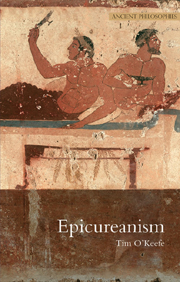Book contents
- Frontmatter
- Contents
- Preface
- Acknowledgements
- Sources and abbreviations
- Chronology
- 1 Introduction: the life of Epicurus and the history of Epicureanism
- I Metaphysics and physics: introduction and overview
- II Epistemology: introduction and overview
- III Ethics: introduction and overview
- 11 Pleasure, the highest good
- 12 Varieties of pleasure, varieties of desire
- 13 The virtues and philosophy
- 14 Justice
- 15 Friendship
- 16 The gods
- 17 Death
- Glossary of terms
- Notes
- Further reading
- Bibliography
- Index
13 - The virtues and philosophy
from III - Ethics: introduction and overview
- Frontmatter
- Contents
- Preface
- Acknowledgements
- Sources and abbreviations
- Chronology
- 1 Introduction: the life of Epicurus and the history of Epicureanism
- I Metaphysics and physics: introduction and overview
- II Epistemology: introduction and overview
- III Ethics: introduction and overview
- 11 Pleasure, the highest good
- 12 Varieties of pleasure, varieties of desire
- 13 The virtues and philosophy
- 14 Justice
- 15 Friendship
- 16 The gods
- 17 Death
- Glossary of terms
- Notes
- Further reading
- Bibliography
- Index
Summary
Epicurus holds that only one's own pleasure has intrinsic value. A consequence of this is that anything else that has value must have value as either (i) a constituent of one's own pleasure or (ii) a means to one's own pleasure. Epicurus is rigorous in following out this implication of his basic ethical position.
Epicurus is happy to challenge many aspects of popular Greek morality on the basis of his moderately ascetic hedonism. For example, a person who endures great hardship and makes substantial sacrifices in his successful pursuit of political office would be regarded by Epicurus not as an admirable patriot but as a fool who is causing himself unnecessary trouble on the basis of a groundless opinion. And the touchy heroes of Homer who are willing to wreak great havoc in order to avenge slights are displaying not a high-minded concern for honour but destructive childishness, and they would do well to heed the adage “Sticks and stones may break my bones, but words can never hurt me”.
Still, Epicurus wishes to institute a substantial modification of and reform to traditional Greek ethical ideals, not to repudiate them wholesale. Epicurus is no Callicles, the unbridled sensualist hedonist of Plato's dialogue the Gorgias, who regards conventional notions of justice and self-control as impediments to attaining pleasure, impediments the strong man rejects. Epicurus wishes to find places within his ethics for virtues such as moderation and courage, for philosophy and wisdom, for justice and friendship, and for reverence of the gods.
- Type
- Chapter
- Information
- Epicureanism , pp. 129 - 138Publisher: Acumen PublishingPrint publication year: 2009

